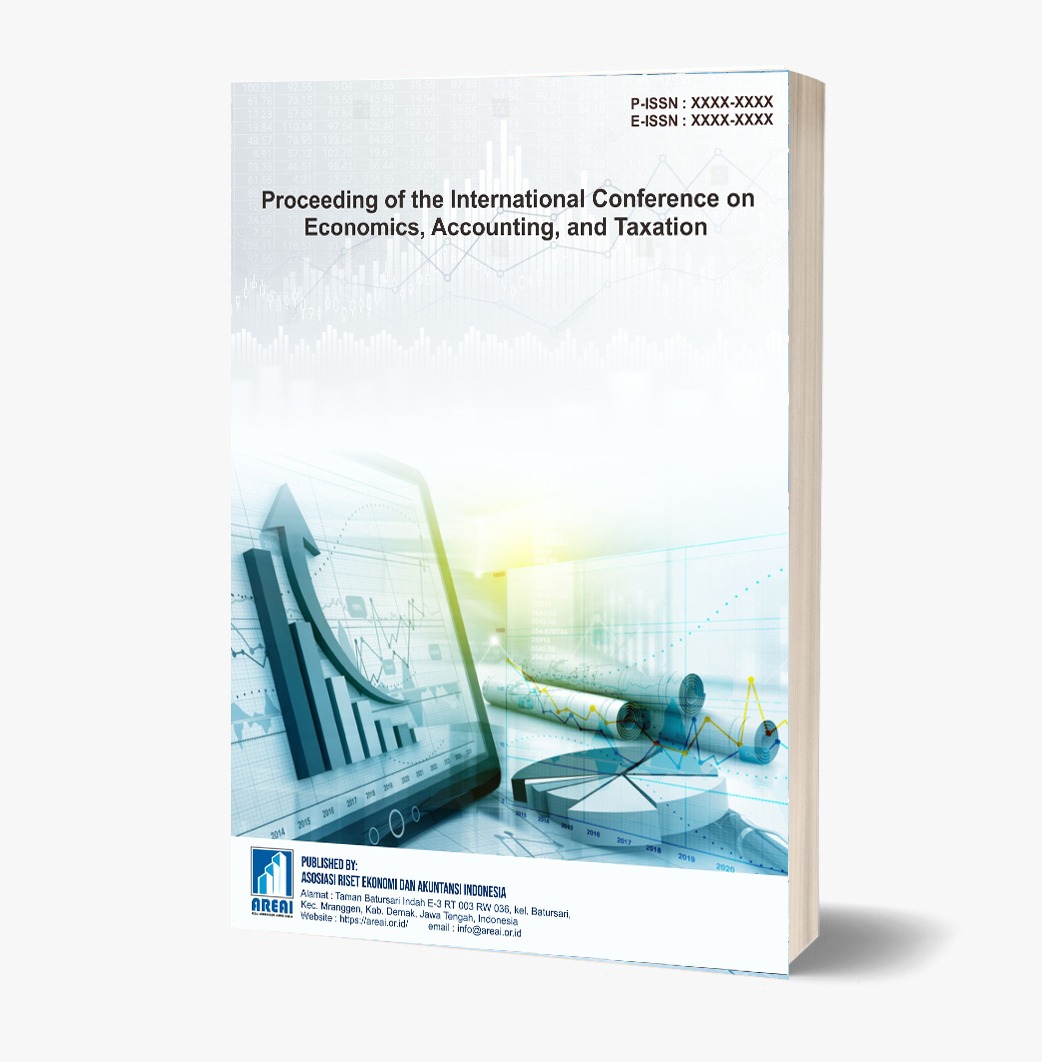Does Sharia Supervisory Board Size and Rotation Affect Islamic Banking in Asia Oic Countries Compliance? Measured By The Maqashid Sharia
DOI:
https://doi.org/10.61132/iceat.v1i2.50Keywords:
Maqashid Sharia Performance, Sharia Supervisory Board, GovernanceAbstract
This study evaluates the influence of the size and rotation of the Sharia Supervisory Board (SSB) on the Maqashid Sharia Performance (MSP) in Islamic banks in 12 member countries of the Organization of Islamic Cooperation (OIC) in Asia. Using data from 49 Islamic banks during the 2021-2023 period accessed through annual reports, the analysis was carried out using a Random Effect Model (REM). Independent variables include SSB size, which is measured by the number of members, and SSB rotation, which is assessed based on member turnover in a year. MSP is measured using the Maqashid Sharia Index with the Abu Zahrah approach involving the dimensions of education, community welfare, and public interest. The results showed that the size and rotation of SSB did not have a significant influence on MSP. These findings indicate weaknesses in Islamic banking governance in OIC member countries, including a suboptimal SSB recruitment system and a lack of effective supervision from high-level Islamic authorities. In addition, the contribution of independent variables to MSP performance is considered low, so it is concluded that other factors, such as SSB experience, sharia internal control system, and regulatory policies, can have a more significant influence.
Downloads
References
Adzhani, R., & Rini, R. (2019). Komparasi Kinerja Perbankan Syariah Di ASIA Dengan Pendekatan Maqasid Syariah. Jurnal Akuntansi Dan Keuangan Islam, 5(1), 5–30. https://doi.org/10.35836/jakis.v5i1.11
Akram, F., & Abrar Ul Haq, M. (2022). Integrating agency and resource dependence theories to examine the impact of corporate governance and innovation on firm performance. Cogent Business and Management, 9(1). https://doi.org/10.1080/23311975.2022.2152538
Al Thnaibat, M., Al-Hajaya, K., & Alshhadat, M. Q. (2024). Do the characteristics of the Sharia Supervisory Board affect the Islamic banks’ performance? Evidence from Arab countries. Journal of Financial Reporting and Accounting. https://doi.org/10.1108/JFRA-05-2024-0271
Antonio, M. S., Sanrego, Y. D., & Taufiq, M. (2012). An Analysis of Islamic Banking Performance: Maqashid Index Implementation in Indonesia and Jordania. Journal of Islamic Finance, 1(1), 2289–2109.
Assenga, M. P., Aly, D., & Hussainey, K. (2018). The impact of board characteristics on the financial performance of Tanzanian firms. Corporate Governance (Bingley), 18(6), 1089–1106. https://doi.org/10.1108/CG-09-2016-0174
Farag, H., Mallin, C., & Ow-Yong, K. (2018). Corporate governance in Islamic banks: New insights for dual board structure and agency relationships. Journal of International Financial Markets, Institutions and Money, 54, 59–77. https://doi.org/10.1016/j.intfin.2017.08.002
Grassa, R. (2015). Shariah supervisory systems in Islamic finance institutions across the OIC member countries: An investigation of regulatory frameworks. Journal of Financial Regulation and Compliance, 23(2), 135–160. https://doi.org/10.1108/JFRC-02-2014-0011
Hakimi, A., Rachdi, H., Mokni, R. B. S., & Hssini, H. (2018). Do board characteristics affect bank performance? Evidence from the Bahrain Islamic banks. Journal of Islamic Accounting and Business Research, 34(1), 1–5.
Khalil, A., & Boulila Taktak, N. (2020). The impact of the Shariah Board’s characteristics on the financial soundness of Islamic banks. Journal of Islamic Accounting and Business Research, 11(9), 1807–1825. https://doi.org/10.1108/JIABR-08-2018-0127
Marhamah, A. F., & Andraeny, D. (2024). Analysis of the sharia supervisory board’s characteristics and intellectual capital on maqashid sharia performance at islamic commercial banks in Indonesia. Proceeding International Conference …, 2(1), 884–896. https://journal.uii.ac.id/inCAF/article/view/32775%0Ahttps://journal.uii.ac.id/inCAF/article/download/32775/16272
Mergaliyev, A., Asutay, M., Avdukic, A., & Karbhari, Y. (2021). Higher Ethical Objective (Maqasid al-Shari’ah) Augmented Framework for Islamic Banks: Assessing Ethical Performance and Exploring Its Determinants. In Journal of Business Ethics (Vol. 170, Issue 4). Springer Netherlands. https://doi.org/10.1007/s10551-019-04331-4
Muhammad, R., Azlan Annuar, H., Taufik, M., & Nugraheni, P. (2021). The influence of the SSB’s characteristics toward Sharia compliance of Islamic banks. Cogent Business and Management, 8(1). https://doi.org/10.1080/23311975.2021.1929033
Nomran, N. M., Haron, R., & Hassan, R. (2018). Shari’Ah Supervisory Board Characteristics Effects on Islamic Banks’ Performance: Evidence from Malaysia. SSRN Electronic Journal. https://doi.org/10.2139/ssrn.3598723
Nugraheni, P. (2018). Sharia supervisory board and social performance of Indonesian Islamic banks. Jurnal Akuntansi & Auditing Indonesia, 22(2), 137–147. https://doi.org/10.20885/jaai.vol22.iss2.art6
Prasetyowati, L. A., & Handoko, L. H. (2019). Pengukuran Kinerja Bank Umum Syariah Dengan Maqasid Index Dan Sharia Conformity And Profitability (SCNP). Jurnal Akuntansi Dan Keuangan Islam, 4(2), 107–130. https://doi.org/10.35836/jakis.v4i2.22
Qathrunnada, E., Samsuri, A., & Hidayat, A. A. (2023). Measuring Islamic Banking Performance Using Maqashid Shariah Index and RGEC: The Malaysian and Indonesian Islamic Banking. Dialektika : Jurnal Ekonomi Dan Ilmu Sosial, 8(2), 281–296. https://doi.org/10.36636/dialektika.v8i2.3271
Taufik, M., & Budiarsyah, G. G. (2024). Board characteristics and profitability in sharia-compliant and non-sharia-compliant firms: beyond mere ceremony? Asian Review of Accounting. https://doi.org/10.1108/ARA-03-2023-0082
Taufik, M., Muhammad, R., & Nugraheni, P. (2023). Determinants and consequences of maqashid sharia performance: evidence from Islamic banks in Indonesia and Malaysia. Journal of Islamic Accounting and Business Research, 14(8), 1426–1450. https://doi.org/10.1108/JIABR-07-2021-0205
Ullah, M. H., & Khanam, R. (2018). Whether Shari’ah compliance efficiency is a matter for the financial performance. Journal of Islamic Accounting and Business Research, 9(2), 183–200. https://doi.org/10.1108/jiabr-01-2016-0001
Winesa, M. F., Syarief, M. E., & Setiawan, S. (2021). Perbadingan Indeks Maqashid Syariah pada Kinerja Perbankan Syariah di Asia dan Eropa. Journal of Applied Islamic Economics and Finance, 2(1), 198–212. https://doi.org/10.35313/jaief.v2i1.2876






